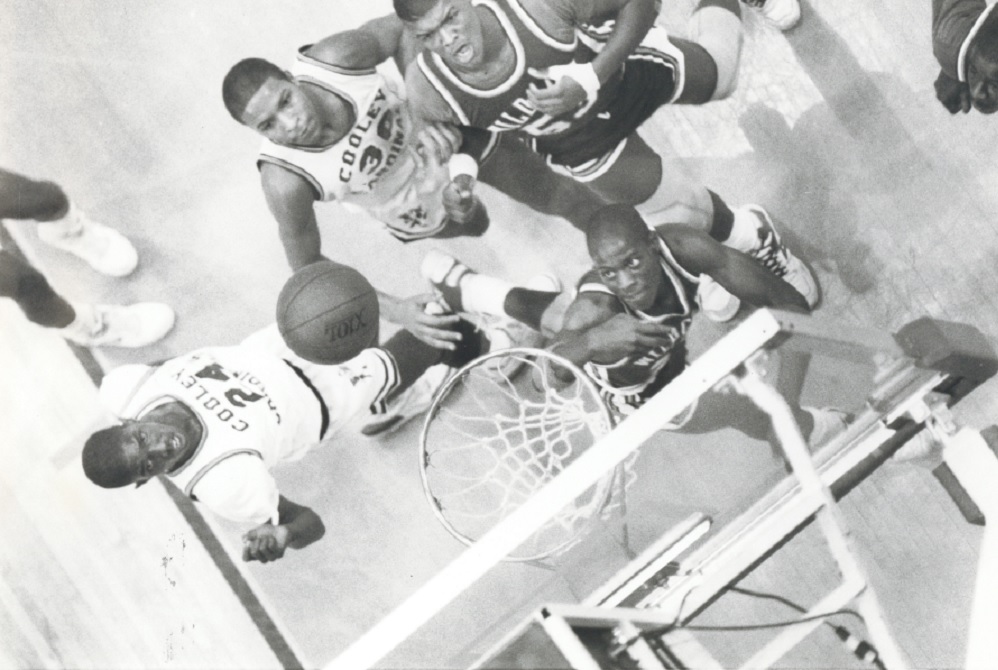
1970-1995: Detroit, Flint Ruled Class A Boys Basketball
By
Ron Pesch
MHSAA historian
March 7, 2022
Geographic domination.
It really hasn’t happened on the basketball court in the MHSAA’s top classification since the mid-1990s.
Class A state titles – designated Division 1 in basketball since 2019 – have bounced around Michigan over the last 25-plus years like, well, an over-inflated wayward basketball. Kalamazoo Central, Pontiac Northern, and Clarkston grabbed back-to-back titles between 1996 and 2021. The Saginaw area locked down five Class A crowns within that stretch; Arthur Hill snagged one in 2006, while Saginaw High immediately followed with two in a row in 2007 and 2008. The Trojans also won in 1996 and 2012. Greater Lansing has three titles – one by Lansing Everett, another by Lansing Waverly, then one by Holt High School – about eight miles outside the city limits.
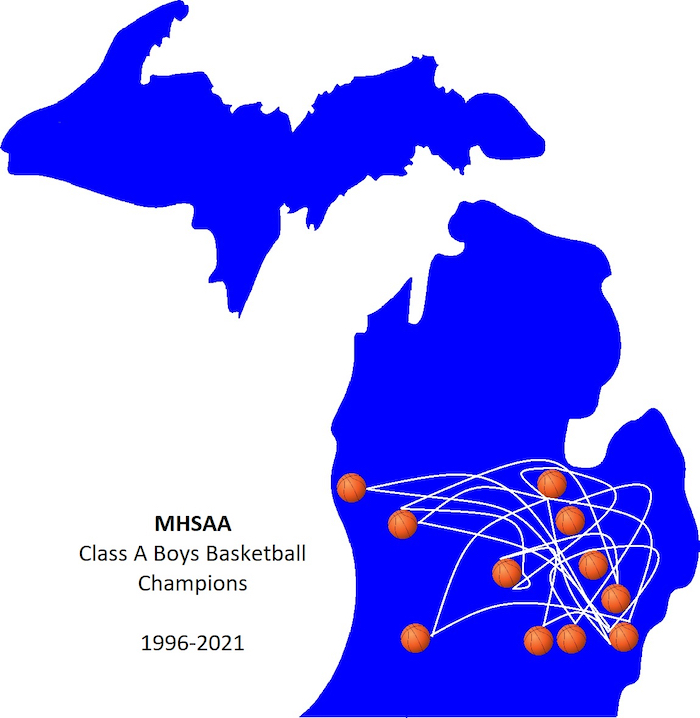 Then it’s single titles to Grand Rapids Ottawa Hills, Rockford, Muskegon, Ann Arbor Pioneer, and Ypsilanti Lincoln. Metro Detroit schools Romulus, Pershing, Central, Western, and U-D Jesuit also have single championships during that span.
Then it’s single titles to Grand Rapids Ottawa Hills, Rockford, Muskegon, Ann Arbor Pioneer, and Ypsilanti Lincoln. Metro Detroit schools Romulus, Pershing, Central, Western, and U-D Jesuit also have single championships during that span.
But from 1970 to 1995, a trip to the Finals to watch the ‘A’ title game meant – with rare exception – you were watching a team from Flint or Greater Detroit. Or both.
Flint: Home of the Vikings
Opened in the fall of 1928, Flint Northern had been the Vehicle City’s top basketball school, winning Class A titles in 1933, 1936, 1939, and 1940 under coach Jim Barclay, then another in 1947 under Les Ehrbright. The Vikings also advanced to the state championship game in 1954 under Carl Stelter, losing to Muskegon Heights in overtime, 43-41.
Then, things went mostly quiet for the next decade and a half.
Jack Marlette was only the fourth varsity basketball coach in school history. Since arriving at Northern in 1949, he had served as head coach in tennis and golf, sophomore coach in basketball and football, junior varsity coach in basketball and football, equipment manager, and head trainer.
Midseason 1955, he replaced Stelter as the varsity basketball coach, when Stelter was named a principal within the Flint school district.
“Marlette coached teams posted a record of 112 victories and 99 defeats,” stated Len Hoyes in the Flint Journal when the coach stepped down in March 1967. “Included are six city championships, two districts, and a Saginaw Valley Conference crown in 1956.” His 1957 team reached the MHSAA Quarterfinals, losing to East Detroit.
With the announcement, Northern wooed 36-year-old Dick Dennis to take his spot come the 1967-68 season. Dennis’ teams had posted an impressive 105-21 varsity record at Alpena High School over seven seasons. Perhaps more impressively, his teams had beaten two of the Flint area’s finest in the MHSAA Regional round in 1966.
Dennis agreed to the move to Northern, “but had one important request,” stated reporter Bruce Johns in the Journal. “He wanted Bill Frieder as the junior varsity coach.”
Frieder, who would ultimately become a legendary basketball figure in Michigan, had landed his first basketball job as JV coach under Dennis at Alpena during the 1965-66 school year.
“… (A) son-in-law of Larry Laeding, former Saginaw High coach and a former player for the Trojans, Freiders (sic) had a 20-11 JV record for two years,” noted the Journal at the time of the hiring. (Laeding’s Saginaw team had won the Class A basketball championship in 1962.)
Dennis’ varsity squad posted an 11-6 record that first year, followed by a 13-6 mark in 1968-69, the program’s best season in 10 years. Frieder’s 1967-68 JV Vikings finished with a 13-3 mark, earning a share of the Saginaw Valley Conference’s title. In his second year, Frieder’s squad went a flawless 16-0.
But a teacher’s strike in Flint the following school year caused Frieder to resign from his position.
“At this point, I want to emphasize that I am highly opposed to teachers’ striking as I feel it sets a poor example for children and such an act reflects upon me personally,” stated Frieder in a letter of resignation to the Flint Board of Education.
Unable to work around it, he stepped aside.
Another shake-up
After three seasons at the helm, in May 1970, Dennis accepted an assistant principal position within the district. Northern administration interviewed nine “capable” candidates for the opening, including the former JV coach.
“Out of the candidates, we felt that Bill was the best qualified,” Northern athletic director Jim Fowler told the Journal’s Dean Howe 22 days later. “Bill is familiar with our situation at Northern, he’s familiar with the kids and unquestionably a fine coach.
“… it was Dennis’s strong recommendation that finally swung the gavel Frieder’s way,” stated Howe.
“Bill has a tremendous ability to get along with the kids,” Dennis had told the Journal in 1969. “… there are some coaches who never accomplish this. Bill’s two outstanding characteristics are his loyalty to the job and kids and his tremendous amount of pride.
“He just loves the game. Bill works just as hard at developing good citizens as he does to winning.”
Under Frieder, the Vikings quickly returned to the state spotlight, winning two straight MHSAA Class A championships in 1971 and 1972.
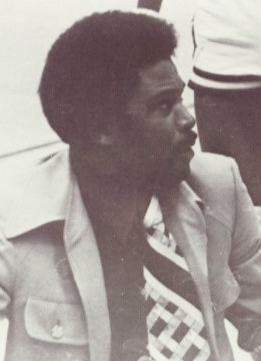 For the first time since 1954, Northern enjoyed final round success. Frieder’s 1971 Vikings, powered by senior Tom McGill and the Britt brothers, Wayman and James, clipped the taller – and favored – crew from Detroit Kettering, led by Lindsay Hairston, 79-78.
For the first time since 1954, Northern enjoyed final round success. Frieder’s 1971 Vikings, powered by senior Tom McGill and the Britt brothers, Wayman and James, clipped the taller – and favored – crew from Detroit Kettering, led by Lindsay Hairston, 79-78.
A year later, Frieder’s team beat Pontiac Central, a squad it had defeated twice during the regular season, 74-71. It was the Vikings’ 33rd-straight victory.
Frieder returned for the 1972-73 season. The Vikings posted an 18-7 record and won a District title. In July, his JV coach from the past two seasons, Grover Kirkland, was named head basketball coach at Flint Northwestern. In August, Frieder resigned. Rumors had been flying that he might go to the University of Michigan as an assistant. A Saginaw native, Frieder stated his “retiring is a result of many things.” Primarily, he planned to return to Saginaw to go into the produce business with his father.
The rumors, it turned out, were true. A little over a month later, the University of Michigan appointed Frieder as assistant basketball coach.
“We think it’s very fine to have a man of Bill’s caliber on our staff,” said Johnny Orr, Michigan’s head men’s basketball coach.
“If at this point in my life, I could describe the job I wanted most, the thing I wanted most to do in my life, this would fit it to a tee,” said Frieder at the time of the announcement.
Bill Troesken, 29, who had stepped down in June of 1973 after three years as varsity coach at Flint Powers Catholic, was hired by Northern to replace Frieder. His team would grab another Class A championship in March 1978.
A Long Drought
Flint’s oldest high school, Flint Central, was opened in 1875. Incredibly, the boys basketball team never won a state title – or even appeared in a championship game – until coach Stan Gooch arrived on the scene.
“Gooch, who starred in basketball at Flint Tech High, Flint Junior College, and Central Michigan (University), began his coaching career as bench boss of the sophomore team at Central High in 1959,” recalled Brendan Savage for MLive in 2008 at the time of his induction into the National High School Athletic Coaches Association Hall of Fame. “He took over the reins of the junior varsity the following year and was promoted to varsity coach in 1966.” Gooch guided Flint Central to its first state championship game in 1967, but Central was trounced by Detroit Pershing, a PSL squad considered by many to be the greatest basketball team in Michigan prep history. Guided by coach Will Robinson, the Doughboys were led on the court by future NBA players Spencer Haywood and Ralph Simpson.
Gooch resigned following the 1967-68 season to become head coach at Flint Junior College (which was converted into a countywide college, and rebranded as Genesee Community College in 1969, then renamed Mott Community College in 1973). After 10 seasons, Gooch stepped down, and within months, he replaced his replacement at Flint Central, Clif Turner, who had guided the program through the 1977-78 season.
Central then won three straight Class A titles from 1981-83, helping to build the legend of Flint basketball.
Then it was Northwestern’s turn. In both 1984 and 1985, Coach Kirkland’s Wildcats beat Detroit Southwestern. With those wins, the Flint city schools had now won six of the last eight titles.
“City of Champions defies explanation” trumpeted the Journal at the end of March 1985, after Northwestern had won Class A and Flint Beecher had won the boys title in Class B.
“No single factor can be pinpointed as the reason Flint has dominated,” wrote Phil Pierson under the headline, “while metropolitan Detroit, an area approximately 10 times larger, has failed to win a Class A Championship since 1979.”
Northwestern’s Glen Rice “became the area’s first recipient of the Mr. Basketball award presented by the Michigan High School Basketball Coaches Association and has been named to the Parade and Basketball Weekly All-American teams. (Beecher’s Roy Marble finished second, while Central’s Terence Greene finished fourth in Mr. Basketball balloting).
Was this success the opportunity to play year-round, asked Pierson. Coaching? The talent on the court?
Other areas across the state featured these same strengths, concluded the writer. “It may just be that the reason for Flint’s success is too obvious to be considered by the philosophers: the cyclical nature of high school sports.
“There was nothing wrong with Flint basketball from 1948-70 when there were no state Class A or B championships. Other teams and programs were just better.”
The Return of the PSL
It took five years after the return to the MHSAA Tournament before the PSL earned a Class A title with that ’67 Pershing squad. The next arrived in 1970, again by Pershing, then in 1973 by Southwestern, and again in 1979 by Mackenzie. Class A was won by Metro Detroit in 1974, by Birmingham Brother Rice, in 1975 by Highland Park, and in 1976 by Detroit Catholic Central.
From 1971 to 1985, Flint’s public school champions had defeated Pontiac Central twice, and PSL teams from Kettering, Murray-Wright, and, famously, Southwestern, on four straight occasions between 1982 and 1985.
On only two occasions between 1975 and 1995 did the Class A crown leave the city of Flint or Metro Detroit. In both instances, it landed in Lansing. In 1977, the Lansing Everett Vikings, led by Earvin Johnson – nicknamed “Magic” by the press – wrestled it away by downing Brother Rice in a 60-56 overtime thriller. In 1980, Lansing Eastern, powered by the state’s first Mr. Basketball winner, Sam Vincent, did the same, with a 64-53 victory over Highland Park.
The Cycle of Basketball
As soon as the ink dried on Pierson’s words, it seems, the cycle rotated.
Romulus took down Southwestern in ’86 before the PSL took control of Class A beginning with the 1987 season. Cooley, coached by Ben Kelso, snagged the first of three straight that year. After finishing as runner-up in seven of the previous eight title games, Southwestern, coached by Perry Watson, grabbed back-to-back victories in ’90 and ’91. Coach Johnny Goston’s Pershing teams beat Benton Harbor for consecutive titles in 1992 and 1993. Then Murray -Wright, coached by Robert Smith, captured its first crown in 1994.
On four of the eight occasions between 1987 and 1994, the Class A game featured an all-PSL card.
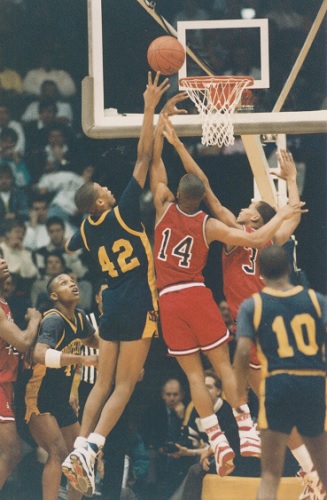 The 1995 Class A final wrapped the amazing run as No. 1-ranked Flint Northern, powered by Mateen Cleaves’ game-leading 28 points and Antonio Smith’s 24 points and 15 rebounds, decimated No. 2 Pershing, 86-64 before a crowd of 11,179 at the Breslin Center. Northern had trailed 44-37 at the half.
The 1995 Class A final wrapped the amazing run as No. 1-ranked Flint Northern, powered by Mateen Cleaves’ game-leading 28 points and Antonio Smith’s 24 points and 15 rebounds, decimated No. 2 Pershing, 86-64 before a crowd of 11,179 at the Breslin Center. Northern had trailed 44-37 at the half.
It was Northern’s first title since 1978. It would also be the program’s last. The introduction of “school of choice” in Michigan in 1996, combined with plunging birth rates in the U.S. that peaked in 1978, meant upheaval in enrollment across the state’s public schools. In Flint, declining enrollment – also impacted by the pending closure of a massive automotive manufacturing complex operated by General Motors known as “Buick City” – forced the closure of Central following the 2008-09 school year. Northern closed in 2013. Following the 2017-18 school year, Northwestern and Flint Southwestern merged, leaving Southwestern as the city’s lone high school.
In Detroit, Northern, Mackenzie, and Murray-Wright were among four high schools closed by the Detroit Public Schools in 2007 due to cost constraints and declining enrollments. Cooley was shuttered in 2010. Southwestern, dedicated in 1922, and Kettering, opened in 1965, both closed in 2012.
Of the 26 Class A title games waged between 1970 and 1995, Flint City Schools and the PSL teams each won nine of those contests. On 15 occasions, the championship game featured a match-up of Flint and Detroit PSL teams. On only seven occasions did schools from outside Wayne, Oakland, or Genesee counties ever crash the championship party. Saginaw High School ended with runner-up honors in 1973, 1976, and 1990, with Lansing and Benton Harbor High Schools being the only others.
Parade of Talent
Basketball junkies attending title games during those years watched an incredible collection of talent come out of those teams from Flint, the PSL and metropolitan Detroit during the span.
On the coaching side:
► Frieder ended up as head coach at Michigan with the 1980-81 season, then Arizona State in 1989.
► Gooch compiled over 400 varsity wins and 86 JV victories during his time at Flint Central.
► Kirkland ended his basketball coaching career in 2000 as Flint’s all-time winningest varsity coach, compiling a 518-148 mark. His Wildcats compiled 60-straight wins between January 1984 and February 1986 and presently rank No. 3 in consecutive wins in state history. In 2020, Detroit Free Press writer Mick McCabe named Northwestern’s 28-0 team from 1985 as the greatest boys basketball team he covered in his 50 years of reporting.
► Southwestern’s Watson served as an assistant at Michigan for two seasons, then guided the men’s basketball team at the University of Detroit Mercy from 1993 to 2008, compiling a 258-185 record over 15 seasons.
► Kelso, a Flint Southwestern graduate who did not play high school basketball but ended up as the all-time scorer at Central Michigan when he graduated in 1973, would be a finalist for the head coaching spot at CMU in 1997. At Cooley from 1984 through 1998, he later served as an assistant basketball coach at Kansas State in 2005-06.
► Kettering’s Charles Nichols, on hand since the school opened, coached tennis, football, and track during his first years at the school. With the 1970-71 season, he took over basketball coaching duties from Walt Jenkins, guiding the team for four campaigns. In December 1974, he joined Dick Vitale’s coaching staff at the University of Detroit for parts of two seasons. He returned to Kettering in 1978 as athletic director, then later served as assistant director of the PSL until his retirement in 2002.
The players included:
Flint
► Central’s Eric Turner, Marty Emery, Mark Harris, Keith Gray, Terence Green, and Darryl Johnson.
► Northern’s Terry Furlow, Dennis Johnson, Gary Pool, Antonio Smith, and Mateen Cleaves.
► Northwestern’s James Person, Jeff Grayer, Glen Rice, Andre Rison, Anthony Pendleton, and Daryl Miller.
Detroit PSL
► Cass Tech’s Tony Jamison and William Mayfield.
► Cooley’s Yamen Sanders, Earl Stark, Rafael Peterson, Michael Talley, and Daniel Lyton.
► Kettering’s Lindsay Hairston, Joe Johnson, Eric Money, and Coniel ‘Connie’ Norman.
► Mackenzie’s Steve Caldwell and Dave Traylor.
► Murray-Wright’s Willis Carter and Robert Traylor.
► Northern’s Katu Davis and Leonard Bush.
► Pershing’s Phil Paige, Robert Hawkins, Calvin Harper, Willie Mitchell, Carlos Williams, Todd Burgan, and Winfred Walton.
► Southwestern’s Darryl Robertson, Antoine Joubert, Clarence Jones, Sam Sillmon, Tarence Wheeler, Anderson Hunt, Loren Clyburn, James Hunter, Jalen Rose, Voshon Lenard, and Howard Eisley.
Metro Detroit
► Birmingham Brother Rice’s Will Franklin, Kevin Smith, and Tim Andree.
► Detroit Catholic Central’s Mike Prince and David Abel.
► Highland Park’s Terry Duerod, Percy Cooper, and Renardo Brown.
► Pontiac Central’s brothers Campy, Larry and Walker D. Russell; Larry Cole, Tim Marshall, and Clyde Corley.
► Romulus’s Terry Mills, and Stevie Glenn.
 Ron Pesch has taken an active role in researching the history of MHSAA events since 1985 and began writing for MHSAA Finals programs in 1986, adding additional features and "flashbacks" in 1992. He inherited the title of MHSAA historian from the late Dick Kishpaugh following the 1993-94 school year, and resides in Muskegon. Contact him at [email protected] with ideas for historical articles.
Ron Pesch has taken an active role in researching the history of MHSAA events since 1985 and began writing for MHSAA Finals programs in 1986, adding additional features and "flashbacks" in 1992. He inherited the title of MHSAA historian from the late Dick Kishpaugh following the 1993-94 school year, and resides in Muskegon. Contact him at [email protected] with ideas for historical articles.
PHOTOS (1) Detroit Cooley's Rafael Peterson (24) and Benson Maurice match up with Flint Northwestern's Archie Munerlyn (53) and Reggie Richardson during the 1988 Class A Final. (2) The Class A/Division 1 championship has been won by teams across the southern half of the Lower Peninsula over the last 25 years. (3) Grover Kirkland, here in 1975, built Flint Northwestern into a power. (4) Detroit Southwestern's Jalen Rose (42) and Cooley's Michael Talley (14) work to grab a loose ball during the 1989 Class A Final. (Photos courtesy of the Detroit News [1] and Gary Shook [4], or collected by Ron Pesch.)
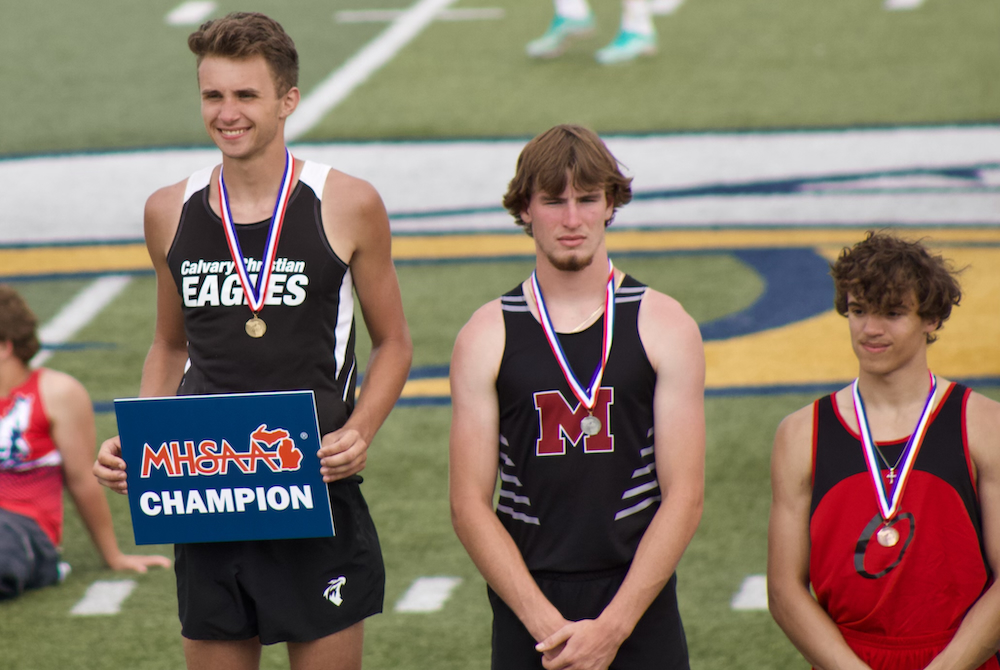
Not Even Sky Seems Limit as Richards Keeps Calvary Sports Soaring
By
Tom Kendra
Special for MHSAA.com
January 4, 2024
Bradley Richards believes that life is all about trying new things, setting bigger goals and pushing yourself to new heights – in his case, literally.
 Richards, now a 6-foot-5, 190-pound junior basketball standout at tiny Fruitport Calvary Christian, played on the school’s fifth-grade team when he was in second grade.
Richards, now a 6-foot-5, 190-pound junior basketball standout at tiny Fruitport Calvary Christian, played on the school’s fifth-grade team when he was in second grade.
He remembers staring longingly at the rim in those days and dreaming about dunking, before making that dream a reality by throwing one down in February of his seventh-grade year.
While his three older sisters - Taylor, Allyson and Kelsey - were leading the Calvary girls basketball program to new heights, he vowed he would do the same with the boys program someday.
Bradley and his teammates accomplished that goal last spring, winning the school’s first boys District basketball title despite a roster with no seniors.
This season, Calvary came flying out of the gate with a 5-0 start and is now 5-2 heading into Friday’s home game against Saugatuck.
“It’s been a lot of fun,” said Bradley, who averages 29 points and 14 rebounds per game. “Our school is so small that we’re more like a family. It’s not about me. I’m just so happy for our school and all of the guys on the team.”
The next goal is to repeat as District champions and try to win a Regional title, before setting his sights at clearing 7 feet in the high jump this spring.
“I’m going to try to get past that this year,” said Bradley in his typical humble, matter-of-fact fashion.
One thing his father and fourth-year Fruitport Calvary Christian boys basketball coach Brad Richards has learned is to not put anything past his only son, the youngest of his four children.
Bradley displayed an interest in music as a young boy and now sings in the school’s worship group and plays the saxophone, piano and guitar. Last fall, he played high school football for the first time as part of a cooperative agreement with Muskegon Catholic Central and wound up starting at wide receiver and defensive back for the state powerhouse program.
“He’s blessed and he’s gifted – yes,” said his father, who also coached all three of his girls during their Calvary Christian basketball careers. “But he works so hard.
“Bradley sets goals and works toward them. He’s always looking for the next thing to do.”
True to his school
One thing he doesn’t like to do is media interviews. Specifically, he doesn’t like calling attention to himself.
“He is pretty quiet and would rather have his teammates get the attention,” said his mother, Joy.
Fruitport Calvary Christian is one of the smallest schools on the entire Lakeshore with 51 students in grades 9-12, and just 17 boys in the high school.
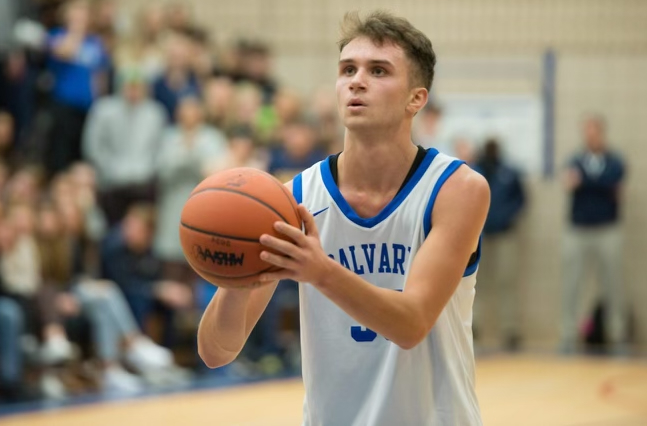 The Eagles take great pride in their ability to compete against much larger schools. They made a huge statement during the first full week of December with three convincing victories over bigger schools.
The Eagles take great pride in their ability to compete against much larger schools. They made a huge statement during the first full week of December with three convincing victories over bigger schools.
That week started on Tuesday, Dec. 5, with Calvary’s first-ever boys basketball win over neighbor Fruitport, a Division 2 school that competes in the Ottawa-Kent Conference Blue. Bradley scored 35 points with 14 rebounds in that game, with clutch free throws by role player Eric Dubois Quayle sealing the win.
Two days later, Richards scored 36 points with 17 rebounds in a win over Grand Rapids Sacred Heart.
Calvary then capped the 3-0 week Friday with a victory over Kent City, another Division 2 school, as Bradley scored 36 points with 18 rebounds.
Calvary is led by the “big three” of juniors Richards and Quinn Swanson and senior Sam Zelenka. Swanson, the team’s second-leading scorer with 17 points plus six rebounds and three assists per game, injured his knee last week against Schoolcraft and his health will have a huge bearing on the team’s success going forward. Zelenka is the top defender and averages 11 points, eight assists and seven rebounds.
The other starters are junior workhorse Zach McFarren, who owns the school’s shot put and discus records and has played all but six minutes over the team’s seven games, and senior Nolan Ghezzi.
Richards, already a two-time Associated Press all-state selection who even made the Basketball Coaches Association of Michigan all-state team as an eighth grader, has seen every gimmick defense to try and shut him down, including box-and-twos and triple teams. He credits his experience in football and track with helping him deal with it.
“There is usually a quick guy in front of me and a big guy behind me,” said Bradley, who scored a career-high 47 points in a game last season. “Football has really helped me, because I’m not as scared of the contact. The high jumping has helped me to elevate and get my shot off.”
Great heights
Jim McHugh is a high jump legend from Pentwater who went on to become a two-time national champion in the event at Hillsdale College, and he now coaches West Michigan athletes in the event.
The first time he worked with Bradley Richards, in April of last year, he knew he had something special on his hands.
“Bradley went up and literally hurdled the bar at 5-11,” said McHugh. “I was in shock. I said to myself: ‘This is gonna be a heck of a ride.’ The kid is a generational talent.”
The coaching of McHugh paid immediate dividends, as Bradley improved from a top jump of 6-1½ as a freshman to 6-6½ in last year’s Regional meet. Then came the Division 4 Finals at Hudsonville a few weeks later.
Bradley won the first track Finals championship for Fruitport Calvary with a leap of 6-10 – which was 3 inches higher than anyone else in any of the four Lower Peninsula divisions and entire Upper Peninsula that day – and caught the attention of college scouts from across the country.
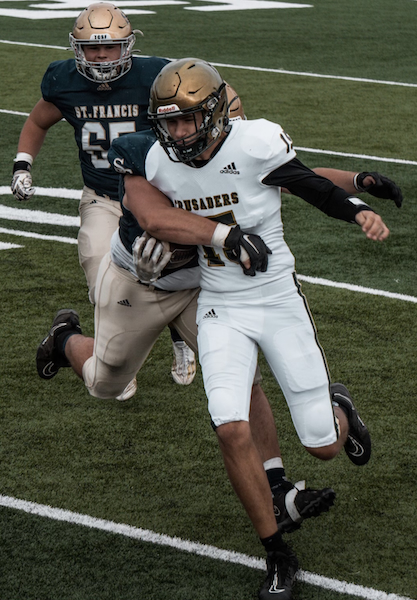 The following week, he competed at the New Balance Outdoor Nationals in Philadelphia and placed second with a jump of 6-8.24.
The following week, he competed at the New Balance Outdoor Nationals in Philadelphia and placed second with a jump of 6-8.24.
McHugh shudders to think of how high his prodigy can soar. He has his sights set on the Division 4 Finals record of 6-10½ (Kurt Schneider, Auburn Hills Oakland Christian, 2009), the Muskegon-area record of 7-0 (Steve Paulsen, Fremont, 1998) and the all-division/class Finals record of 7-1 (John Payment, Brimley, 1989).
“God has given him incredible talent, but he also has the desire it takes,” said McHugh, who is also working with another Division I college high jump prospect in Hart junior Addison Hovey. “I gave him a workout plan, and he has done every bit of it. He has cleaned up his diet, done the cold showers and the cold bathtubs, everything. I’m excited to see the results.”
Richards, whose first love was basketball, admits he is smitten with the high jump and seeing how high he can soar.
Now, when asked about his favorite athletes, he still mentions Michael Jordan and Kevin Durant, but he also includes Olympic gold medalist high jumper Mutaz Barshim of Qatar – who made news by not taking additional jumps at the 2020 Olympics in Japan, thereby sharing the gold medal with Gianmarco Tamberi of Italy.
“I just respect that so much, sharing the gold medal,” Bradley said.
Decision time
Now the Bradley Richards recruiting saga has begun and, for him, it’s not just about choosing what school – it’s also about choosing what sport.
“I would like to do both, play basketball and high jump in college, if possible,” Bradley said.
That would certainly be a possibility if Bradley follows in his family’s footsteps at Cornerstone University. His father was a basketball standout at Cornerstone, which is where he met Joy, and all three of his sisters played for the Golden Eagles. (Kelsey is currently a student assistant for this year’s team.)
Playing both may not be possible if he pursues high jump at the Division I level, where Michigan and Illinois are among schools actively recruiting him.
“I know at some point I’m going to have to make a decision, but I don’t have to right now,” said the 17-year-old Bradley. “So it doesn’t do me any good to sit and stress about it all the time.”
Instead, he is focused on more immediate goals.
The first is figuring out a way for his basketball team to snap a two-game losing skid and get positioned for another postseason run.
Then it will be trying to clear the magical high jump number of 7-0, and beyond. And don’t forget football, where he would love to start off his senior year by helping Muskegon Catholic improve on its 6-5 record from a year ago and make a run at the school’s 13th state football championship.
Only after all of that will it be college decision time.
“It’s not an easy choice, and it will take a lot of prayer and discernment,” admitted Richards, who will look for help from his immediate family and his school family in making his choice. “I’ll figure it out. I usually do.”
 Tom Kendra worked 23 years at The Muskegon Chronicle, including five as assistant sports editor and the final six as sports editor through 2011. E-mail him at [email protected] with story ideas for Muskegon, Oceana, Mason, Lake, Oceola, Mecosta and Newaygo counties.
Tom Kendra worked 23 years at The Muskegon Chronicle, including five as assistant sports editor and the final six as sports editor through 2011. E-mail him at [email protected] with story ideas for Muskegon, Oceana, Mason, Lake, Oceola, Mecosta and Newaygo counties.
PHOTOS (Top) Fruitport Calvary Christian’s Bradley Richards stands atop the podium after winning the high jump last spring at the Lower Peninsula Division 4 Finals. (Middle) Richards lines up to shoot a free throw. (Below) Playing as part of a cooperative with Muskegon Catholic Central, Richards works to get away from a Traverse City St. Francis tackler. (Track photo courtesy of Joy Richards; basketball and football photos courtesy of Local Sports Journal.)

